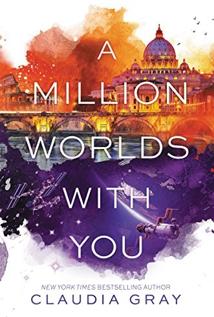
Fate doesn’t guarantee us a happy ending. We’re not promised to be together no matter what. But in dimension after dimension, world after world, fate gives us a chance. Our destiny isn’t some kind of mystical prophecy. Our destiny is what we do with that chance.
A Thousand Pieces of You introduced us to the multiverse and Ten Thousand Skies Above You brought it to the brink of war. Now, in A Million Worlds with You, the fighting is on.
The core of the story comes in two parts:
For one, we have Marguerite chasing a twisted echo of herself (who she names Wicked; I do enjoy how everyone just goes with her names throughout the book). The entire idea that Marguerite can’t jump into the same world as Wicked and has to trail behind, digging herselves out of any trouble Wicked gets them into is fascinating. But by itself, entirely reactive.
So for two, we have a war between dimensions. We have some worlds that were already aware of parallel realities, but now, finally, they are beginning to work together and push back against the Triad.
To war!
I do love the premise. It’s solidly written and a worthwhile finish to the trilogy (although now I want more! what happens between all the worlds next?!). It … was rough to start it, mostly due to all the damage Marguerite and especially Paul went through last book, but that’s sort of the the point.
Well worth the read.
A few more detailed points.
On the plus side, it’s (as mentioned) a fascinating plot. The first book and to a lesser extent the second, were smaller, more personal stories. About Marguerite and her family. Now we’re really getting into the larger scales of war–even if Marguerite is still the heart of it all.
And as I mentioned in the last book, I really enjoy seeing all the variants of Marguerite and Paul and all their friends and family. The ideas that every single one of these copies is someone you could have been–despite the fact that some are good and some are absolutely Twisted–is fascinating to me. I think this this book really does get into it well.
Wicked in particular is fascinating. The idea that there’s the potential for darkness in anyone is worth exploring. And if you think about it… didn't Marguerite prime out right murder the Connelly of the Rome-verse?
But that’s also a weakness. Splintering is… weird. It’s a good way to set off the plots of the second and third books, but it’s perhaps a step too metaphysical and weird for me, especially when the Firebirds can somehow … just put people back together? Why do they even have that ability? What even is a soul anyways.
Speaking of science, the idea that you can twist a reality and destroy it is a solid way to push the story. Taking that a step further, that realities branch from one another again and again and destroy a reality will also destroy any that branched from it? That I love. I don’t think they get enough into how exactly that would work / measuring which realities came from one another is not discussed enough though.
I’m curious if any of the realities we meet are particularly ‘old’ in this whole branching scheme. Not that they’d be any more real, but I’m still interested.
In any case.
Read the book. It’s not really ‘hard’ science fiction, but it’s as enjoying as the first two were and a solid conclusion to the series.
Onward!